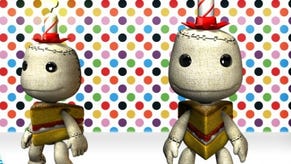LittleBigPlanet 2
Intelligent design.
The weakest aspect to the game remains enemy design. This is a toolkit perfect for building rich, complex, textured levels. But when it comes to creating moving enemies, the DIY tools on offer to designers have seemingly stunted their imaginations. Enemies move like awkward clockwork toys, rarely following Sackboy's movements, instead simply patrolling lone set paths, exposing a weak spot when their back is turned. Few of the end-of-world bosses stick in the mind, their attack patterns rote and unimaginative, repeating the same moves till their weak spot is assaulted. As a result, LBP2's strongest obstacles remain those built into the worlds you navigate, rather than the creatures that patrol them.
On the other hand, the levels in which you are asked to shepherd or lead friendly Sackbot charges are exceptional. With eyes for hearts, these knitted robots follow your Sackboy slavishly around a giant, clanging factory, being whisked into air tubes and thrown around as you desperately try to lead them in the right direction and keep each one alive. The custodian mechanic adds a new flavour to the somewhat simplistic platforming, because the number of Sackbots you manage to save at the level's conclusion increases the rewards in kind. Of course, each of these fresh design ideas has the added benefit of showing you what is possible with the toolkit when you get your hands on it.
And it is only when you finally decide to look at the level-creation side of the package that this sequel begins to justify itself fully. Building a LittleBigPlanet level previously required players to have the inventiveness of Heath Robinson and the graft of the Egyptian slaves that built the pyramids. But for LBP2, the toolset has been expanded and at the same time somehow simplified. The key here is flexibility. The boundaries of game creation have been significantly widened in the sequel, so that creating a side-scrolling shoot-'em-up or a top-down twin-stick shooter, or even building a makeshift musical instrument is less a case of working around the toolset than working with it. For budding game designers, the overhaul is invaluable.
The introduction of the microchip is particularly significant. Now bosses, vehicles, puzzles and machines can be controlled by circuit boards that you resize, add switches and logic to, and then wire up. It uses far less 'thermometer' space (LBP's metaphor for system memory) while simultaneously allowing for far more complex behaviours. Media Molecule claims that the famous Little Big Computer logic can be condensed and shrunk onto a single microchip in LBP2, the significance of which will be directly in step with your own imagination.
The developer's motto for the LBP2 toolkit is "A Handmade Arcade", the attract mode video showing some approximations of popular games such as Geometry Wars that have been created using it. This will no doubt be prophetic as we can expect to see a hundred thousand amateurish knock-offs of PSN and XBLA titles in the months following release. But when the wheat is separated from the chaff, there is little doubt that LBP2's online servers will play host to some extraordinary content.
The hope seems to be that entire small games will be crafted using the toolset, rather than mere curio levels that are good for a single playthrough and little more afterwards. Counter-Strike was created by amateurs using the Half-Life toolkit, and while it seems unlikely that anything as significant or enduring as that will be born from LBP2, there's a better chance than ever that a console game could, through the creativity and industry of its players, sprout something substantial rather than merely distracting.
Even if you have no interest in creating levels yourself, LittleBigPlanet 2 merits its existence, not only because of the potential novelties its users will create with the vastly improved toolset, but also for the stronger, more refined single-player campaign. Strip away the relentless good looks and the generous open-source playpen, and the bare, underlying platformer's shortcomings may hold it back from classic status. But as a package, as a concept, as an unfinished story, LittleBigPlanet 2 is a world apart.








